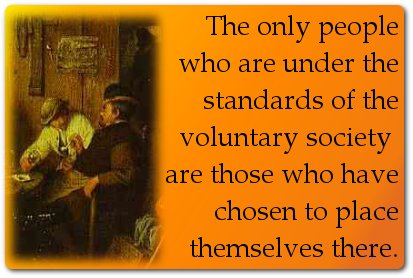Tolerance in Involuntary Societies
 In any human society some patterns of conduct will be tolerated and some will not. Societies differ over the degree to which they tolerate ideas: Western democracies (especially the United States) try to tolerate the expression of all ideas. Other societies sharply restrict the sphere of ideas that may be expressed.
In any human society some patterns of conduct will be tolerated and some will not. Societies differ over the degree to which they tolerate ideas: Western democracies (especially the United States) try to tolerate the expression of all ideas. Other societies sharply restrict the sphere of ideas that may be expressed. No society is possible without some element of tolerance, but no society tolerates absolutely every idea and action. Therefore, every society must make decisions about what to tolerate. The problem is to make those decisions in a way that is not purely arbitrary or even tyrannical. How should a society choose what to tolerate?
No society is possible without some element of tolerance, but no society tolerates absolutely every idea and action. Therefore, every society must make decisions about what to tolerate. The problem is to make those decisions in a way that is not purely arbitrary or even tyrannical. How should a society choose what to tolerate?
In previous articles we have explored ways of nuancing this question. First, we discovered that toleration of a belief or an action does not require agreement or affirmation. By the same token, disagreement does not constitute intolerance. In fact, toleration assumes a disagreement. A tolerant person is not one who agrees, but one who refuses to end a disagreement by resorting to force or coercion.
Second, we discovered that, in at least some cases, ideas can be tolerated more readily than deeds. To advocate an idea is not the same thing as engaging in the conduct that the idea implies. In some cases, however, advocacy can turn into either involvement or incitement, and in such cases, even the idea cannot be tolerated.
To these two ways of nuancing the question, we must now add a third. This third factor is the distinction between voluntary and involuntary societies. The boundaries for tolerance within involuntary societies must be much more expansive than those within voluntary societies.
By a society I simply mean a relationship involving at least two persons. An involuntary society is a relationship into which the parties do not choose to enter. It is thrust upon them, whether they wish it to be or not. The most obvious example of an involuntary society is a nation.
Normally, people are born into the citizenship of a nation without any choice in the matter. Abandoning or changing their citizenship is difficult or impossible to do. With some exceptions, few of us had any choice about whether we would be Turkish, Salvadoran, French, or United States citizens. Furthermore, any choice to alter our citizenship would be very complicated to implement.
For a nation to control the ideas and conduct of its citizens in any unnecessary way is tyranny. Under normal circumstances, the nation must permit the free exchange of ideas and the free pursuit of activities. Of course, limitations to tolerance do exist, and one of the purposes of the present essays is to discover those limitations. The pertinent point, however, is that an unjustified limitation is a serious thing. To use the coercive authority of the state to control ideas and conduct is, unless justified, oppressive and cruel.
This point is very serious. It implies that involuntary societies such as nations should be reluctant to place strictures upon ideas or even actions. Such strictures must be justified before being put into place. To impose a stricture simply because of a chance that it might solve some social problem would be mere social tinkering. This use of the state’s force is irresponsible and even immoral.
The coercive power of the state should never be invoked for trivial reasons. Within an involuntary society such as a nation, disagreements will inevitably erupt over ideas and over conduct. These disagreements will sometimes be strongly felt. People on each side will take offense at the views of people on the other side. To ask for the use of force merely because one is offended is a trivial reason for appealing to the power of the state.
By itself, being offended is never a reason to resort to coercion. Being offended is an inescapable aspect of the human condition. It is something to which mature people get accustomed. They learn to control themselves in the face of offenses. This self‐control is an important aspect of good manners and civility. In short, mature people will be the last to appeal for intervention from the state simply because they are offended. Nor will they resort to tactics such as intimidation, threats, innuendo, or other forms of coercion.
Incidentally, this is a lesson that Christians desperately need to learn when dealing with issues in their larger civilization. The mere fact that some ideas or actions offend them is not relevant to the debate about those ideas and actions. This point has been driven home during the controversy about The Da Vinci Code. Too often, Christians have howled in public about how offensive the book and movie are. They have called for punitive measures such as bans and boycotts. In many cases, however, they have failed to meet bad ideas with better ideas. That we are offended by Dan Brown’s work is not a point that should matter in the public square. That we can show where Dan Brown is in error is what should matter. It is our responsibility to make the proper appeal.
Even involuntary societies must have some boundaries to tolerance, as everyone knows. Those boundaries, however, must not be arbitrary. They should not be grounded in the fact that someone gets offended by a particular expression or action. Involuntary societies must perceive tolerance as a virtue. We must presume tolerance as the default position. Before we appeal for coercive measures to be taken against an action or an idea, we should require good reason for not tolerating it.
Within involuntary societies, tolerance is a virtue. What about voluntary societies, however? Can voluntary societies afford to be as tolerant as involuntary societies must be? That question deserves its own discussion.
THE CORONET
Andrew Marvell (1621‐1678)
WHEN for the thorns with which I long, too long,
With many a piercing wound,
My Saviourʹs head have crowned,
I seek with garlands to redress that wrong,—
Through every garden, every mead,
I gather flowers (my fruits are only flowers),
Dismantling all the fragrant towers
That once adorned my shepherdessʹs head :
And now, when I have summed up all my store,
Thinking (so I my self deceive)
So rich a chaplet thence to weave
As never yet the King of Glory wore,
Alas ! I find the Serpent old,
That, twining in his speckled breast,
About the flowers disguised, does fold
With wreaths of fame and interest.
Ah, foolish man, that wouldst debase with them,
And mortal glory, Heavenʹs diadem !
But thou who only couldst the Serpent tame,
Either his slippery knots at once untie,
And disentangle all his winding snare,
Or shatter too with him my curious frame,
And let these wither—so that he may die—
Though set with skill, and chosen out with care ;
That they, while thou on both their spoils dost tread,
May crown Thy feet, that could not crown Thy head.

–––––-
This essay is by Kevin T. Bauder, president of Central Baptist Theological Seminary. Not every one of Central’s professors, students, or alumni necessarily agrees with every opinion that it expresses. In The Nick of Time is also archived here.
- 2 views


Discussion